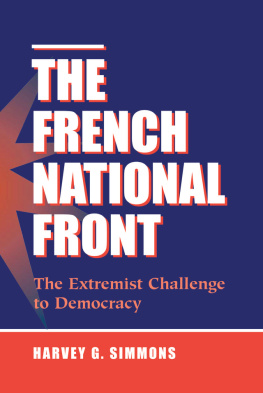THE FRENCH NATIONAL FRONT
The French National Front
The Extremist Challenge to Democracy
Harvey G. Simmons
First published 1996 by Westview Press
Published 2018 by Routledge
711 Third Avenue, New York, NY 10017, USA
2 Park Square, Milton Park, Abingdon, Oxon OX14 4RN
Routledge is an imprint of the Taylor & Francis Group, an informa business
Copyright 1996 by Taylor & Francis
All rights reserved. No part of this book may be reprinted or reproduced or utilised in any form or by any electronic, mechanical, or other means, now known or hereafter invented, including photocopying and recording, or in any information storage or retrieval system, without permission in writing from the publishers.
Notice:
Product or corporate names may be trademarks or registered trademarks, and are used only for identification and explanation without intent to infringe.
A CIP catalog record for this book is available from the Library of Congress
ISBN 13: 978-0-8133-8979-0 (pbk)
ISBN 13: 978-0-8133-2891-1 (hbk)
I began research for this book on the French National Front some years ago after I had written about mental retardation policy and mental health policy. Having taught European politics for many years at York University, I was surprised that in the early 1990s academics (with some exceptions) continued to fret about the European left while ignoring the significant, and dangerous, rise of the extreme right. My purpose, therefore, was to write a clear, straightforward account of the most popular and dangerous extreme right political party in Western Europe, the French National Front.
Along with other extreme right parties, the National Front loudly proclaims its allegiance to democracy, refuses the extremist label, and demands to be included among the mainstream parties of the right. However, thinly concealed behind a rhetorical fog of coded language and slogans, the Front's ideology is pervaded by anti-Semitism, racism, and hostility to parliamentary democracy. In addition, Jean-Marie Le Pen, the Front's charismatic leader, has surrounded himself with ex-Vichyites, ex-fascists, or fundamentalists of the far right whose commitment to democracy and tolerance is open to question.
In the June 22, 1995, New York Review of Books, Italian author and scholar Umberto Eco discussed the revival of the extreme right and put forward a model of "Ur-Fascism." Eco, like many other people, is troubled by the ambiguities of the contemporary extreme right: It disclaims any relation to prewar or wartime fascism, yet its ideology echoes many of fascism's principal themes. "Ur-Fascism," said Eco, "is still around us, sometimes in plainclothes. It would be so much easier, for us, if there appeared on the world scene somebody saying, 'I want to reopen Auschwitz, I want the Black Shirts to parade again in the Italian squares.' Life is not that simple. Ur-Fascism can come back under the most innocent of disguises."
The purpose of this book is to discover what lies behind the plainclothes of the French National Front. the Front: anti-Semitism, immigration and racism, electorate, organization, political discourse, and women and the Front.
The book concludes in an ambiguous fashion: The Front may not be an old-style fascist party, yet its ideology and the political beliefs of its leadership pose a serious threat to democracy. If the Front should ever win national office in France, it could undermine the foundations of the Fifth Republic. Whatever it is, therefore, the Front is a dangerous political party.
This book is based almost entirely on secondary sources. Except for two trips to France when I did research on the pro-Front press at the Bibliothque Nationale, most of my work was conducted at the library of the London School of Economics during a sabbatical year and at the York University library. Recently, I was fortunate in being able to purchase copies of the pro-Front weekly National Hebdo in downtown Toronto and thereby to keep in touch with what Front leaders and sympathizers had to say about issues of the day.
I wish to thank the London School of Economics for its courtesy in providing me with a library card and use of a computer, all in the space of twenty minutes when I first applied. Also, Scott Library at York University is a wonderful place for research: The staff are always pleasant and helpful, the facilities are commodious, and, best of all, through the efficient interlibrary loan service one can obtain books or journals from around the world. Add to that the resources of the Robarts Library at the University of Toronto, and one has available in metropolitan Toronto a vast array of resources for research on European politics.
Above all, I made great use of Le Monde. I especially want to thank Lili Minski of the periodical room: She always made sure that, once the micro-film had arrived, I was supplied with copies of Le Monde and any additional French popular or scholarly journals I needed for research.
Finally, as always, I thank Eileen.
Harvey G. Simmons
The National Front is an extremely dangerous party. I know what I'm talking about; I know them. It is not a party like the others. In the entourage of Le Pen there are racists, xenophobes and antisemites. That is why I have broken all relations with them. It is necessary to defend humanist values against them.
Jacques Dominati, in Le Monde, December 7, 1989
The National Front cannot be considered a party like the others to the extent that its project bears the seeds of political totalitarianism.
Olivier Biffaud, in Le Monde, November 13, 1992
The National Front has no future became it really does not exist. It is not grafted on to any anthropological areas or particular systematic values.... It lacks a coherent ideology.
Emmanuel Todd, The Making of Modern France
The specter of right-wing extremism is haunting Europe. Although the extreme right seemed to disappear along with Nazism and fascism after World War II, it never completely vanished. In the late 1940s and 1950s, tiny groups of fascists or ex-Nazis met to discuss common problems, publish newspapers or periodicals, and organize extreme right movements or political parties. However, Europe was basking in the long economic boom that followed World War II, parliamentary democracy had been restored, and anti-Semitism and authoritarianism were politically unpopular. In these circumstances the extreme right seemed doomed to permanent exile on the periphery of the political system. Yet over the past four decades, extreme right parties have emerged in almost every Western European country and, since the fall of the Berlin Wall, in Eastern Europe and the former Soviet Union as well.
The largest and most influential of these parties is the French National Front (NF). Its leader, Jean-Marie Le Pen, won 15 percent of the vote in the April 1995 presidential election, and the Front elected more than one thousand members to municipal councils and three mayors in the local elections that followed in June. Not only has the Front become the third most popular political party in France, but also its anti-immigration campaign has led to a tightening of France's immigration laws and increased policing of immigrant ghettos. The NF's barely concealed racism has contributed to growing public hostility to Muslim and African immigrants.
There is a good deal of ambiguity about the true nature of the National Front. While the Front rejects socialism, liberalism, and fascism and is skeptical of Enlightenment values of autonomy, rationality, and egalitarianism, its ideology is an odd pastiche of elements from the history of fascism and the extreme right, with references to prewar anti-Semitism, Vichy, fundamentalist Christianity, neofascism, racism, and the philosophy of the French new right. To complicate matters even more, all this is overlaid with protestations of support for democracy and democratic values. The Front itself claims that "it is not a structure inherited from the past" but is rather "a new and original political expression whose roots extend into the depths of our history and values." But which history? The history of the Republic? Or of Vichy? And what values?











